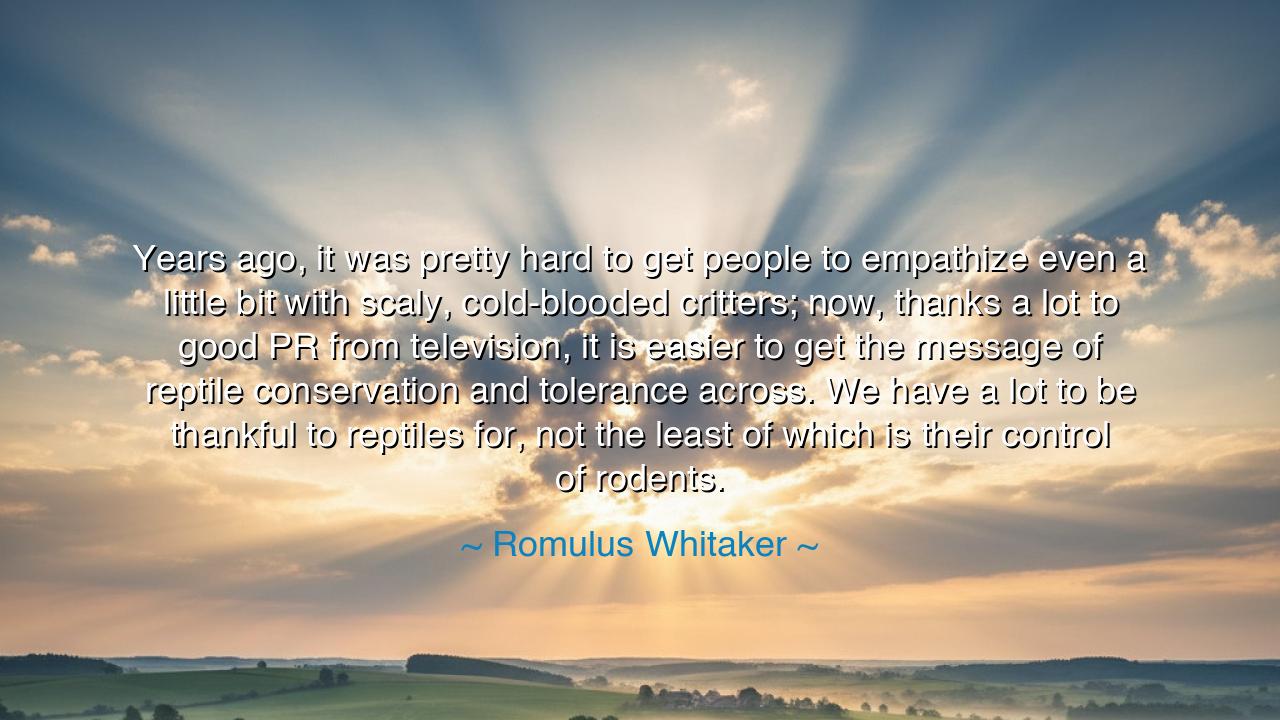
Years ago, it was pretty hard to get people to empathize even a
Years ago, it was pretty hard to get people to empathize even a little bit with scaly, cold-blooded critters; now, thanks a lot to good PR from television, it is easier to get the message of reptile conservation and tolerance across. We have a lot to be thankful to reptiles for, not the least of which is their control of rodents.






When Romulus Whitaker proclaims, “Years ago, it was pretty hard to get people to empathize even a little bit with scaly, cold-blooded critters; now, thanks a lot to good PR from television, it is easier to get the message of reptile conservation and tolerance across. We have a lot to be thankful to reptiles for, not the least of which is their control of rodents,” he speaks to the transformation of human perception, the shift from fear to understanding, from disdain to respect. In his words lies a call to open our hearts to the misunderstood creatures of the earth, to see in them not menace but value, not ugliness but purpose.
The origin of this sentiment lies in humanity’s ancient relationship with reptiles. For generations, serpents, lizards, and crocodiles have been cast as symbols of danger, cunning, and death. Myths across cultures often placed them as adversaries: the serpent in Eden, the dragon slain by the hero, the crocodile lurking in sacred rivers. This imagery hardened human hearts, making it difficult to show compassion or empathy toward such creatures. Whitaker, a naturalist and conservationist, saw this wall of fear firsthand, and yet he rejoices that through education and storytelling—through the modern power of television—the wall has begun to crack, and light now enters.
History gives us a mirror. Consider the wolf in Europe, long seen only as a beast to be hunted, a threat to sheep and to man. For centuries, wolves were exterminated with merciless zeal. Yet in modern times, as knowledge spread and their role in ecosystems was better understood, the wolf was slowly reimagined—not as a terror to be destroyed, but as a keystone species that maintains balance. Just as the wolf was redeemed through knowledge, so too Whitaker declares that reptiles, once reviled, now find a place of tolerance in the human mind.
His gratitude is both practical and profound. “We have a lot to be thankful to reptiles for, not the least of which is their control of rodents.” Here, Whitaker reminds us that the creatures we fear may be the very guardians of our fields and stores. Without snakes, rats and mice would overrun crops, spreading famine and disease. The “scaly, cold-blooded critters” so often hated are in truth silent benefactors, servants of balance. To be thankful for them is to acknowledge that every creature, however humble or strange, has its place in the great web of life.
There is a deeper teaching here: that ignorance breeds fear, and fear breeds destruction. By changing perception—by showing reptiles on television, by telling their stories, by giving them dignity—Whitaker and others have planted the seeds of conservation. This is wisdom for all ages: that to protect what is misunderstood, one must first teach the heart to see value where once it saw only danger. The lesson is not about reptiles alone, but about all that is alien to us: other cultures, other peoples, other ways of being. Where there is fear, plant knowledge; where there is hatred, plant respect.
The lesson for us, then, is profound: gratitude must extend beyond what is beautiful or familiar. We must learn to be thankful not only for the gentle lamb or the singing bird, but also for the serpent in the grass, the lizard in the sun, the crocodile in the river. Each plays its role in creation, and to despise them is to despise the balance of the world itself. To live in harmony is to see purpose in all things, even those that unsettle us.
Practical wisdom follows. Teach others about the hidden value of the creatures they fear. Share knowledge generously, for in knowledge lies empathy. Do not kill without reason, but seek instead to understand. When you see a snake or a lizard, remember Whitaker’s words: these are guardians against plague and famine, silent allies of humankind. Let your children grow not with fear, but with reverence for the whole of nature’s design.
Thus, in the words of Romulus Whitaker, we hear an ancient teaching renewed: that even the creatures most despised are worthy of respect, and that knowledge transforms fear into gratitude. Let us walk, then, as wise stewards of the earth, giving thanks for all of life—scales and feathers, fur and skin—knowing that each has its purpose, and that the world is whole only when every voice of creation is honored.






AAdministratorAdministrator
Welcome, honored guests. Please leave a comment, we will respond soon